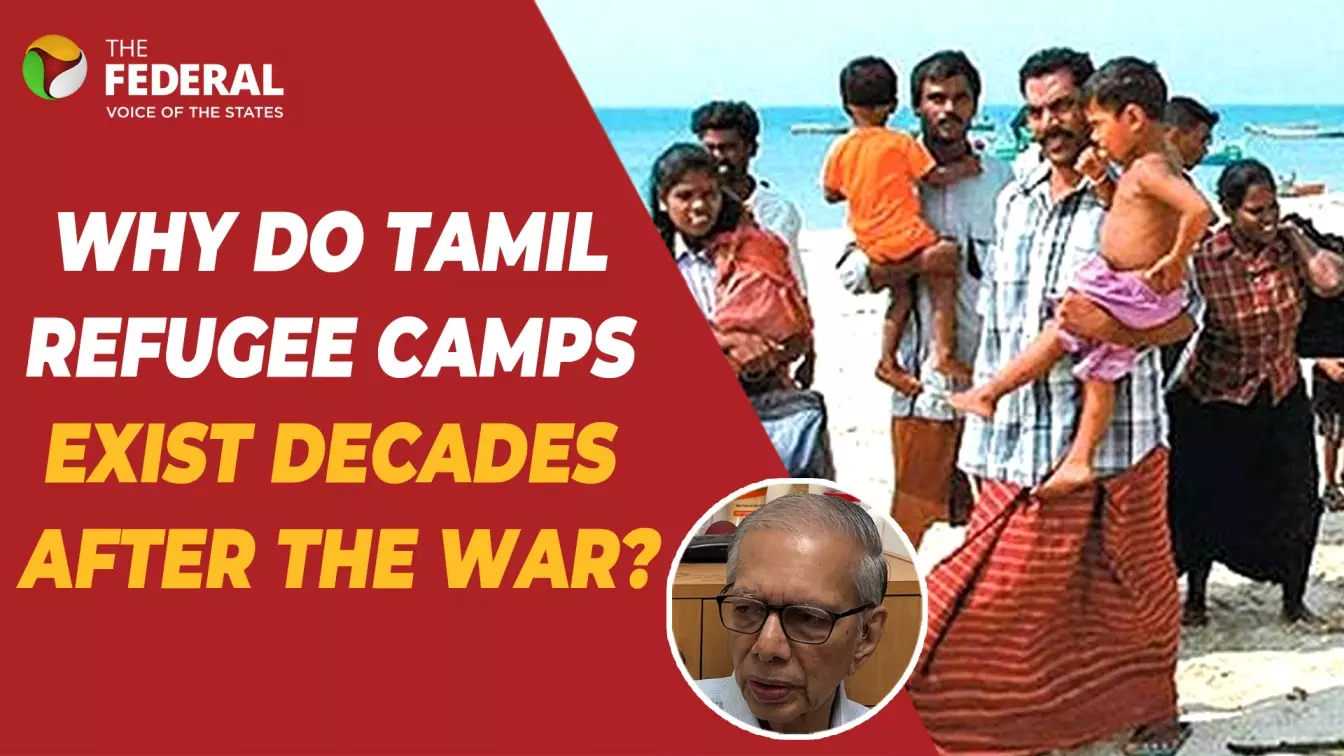
Interview | Dignified return only solution to India’s refugee crisis: SC Chandrahasan
OfERR founder discusses India’s approach to refugees, the need for legal safeguards, and why refugee camps hosting Lankan Tamils still exist in India

India has sheltered Sri Lankan Tamil refugees for over four decades, especially in Tamil Nadu. But why do refugee camps still exist even though the Sri Lankan civil war is long over and India doesn't have a dedicated law for refugees in place? In a conversation with The Federal's Pramila Krishnan, SC Chandrahasan, founder of the Organisation for Eelam Refugees Rehabilitation (OfERR), discusses India’s approach to refugees, the need for legal safeguards, and why a dignified return remains the best solution.
The Supreme Court recently said India is not a 'dharamshala' to accommodate all kinds of refugees. What do you make of this, especially since India has no dedicated refugee law? How are refugees like the Sri Lankan Tamils accommodated here?
There are countries that follow the international refugee convention, and others that go by their own system. India is one of those countries that has its way of handling refugee matters.
Also read: 'India not a dharamshala': SC junks Sri Lankan's plea for refuge
Despite not having a specific refugee act, I have not come across a case since 1983 where Sri Lankan Tamils who were genuinely seeking asylum or were displaced were denied consideration. Tamil Nadu, in particular, has gone above and beyond—sometimes even offering more support to refugees than to its own citizens.
If the war in Sri Lanka is over and there has been a political change there, why do refugee camps in Tamil Nadu still exist?
A new government may have come in, and there is hope for a different approach. But people have trusted too many times before and been disappointed. There’s still fear.
Confidence will take time. Once the return process begins and is seen as reliable, more people will start going back and settling. Trust needs to be rebuilt gradually.
Does the absence of a refugee law give the government unchecked power to label anyone as an illegal immigrant?
Theoretically, yes. But as far as Sri Lankan Tamil refugees are concerned, they have been accommodated in India since 1983. I haven't seen any case where a genuine refugee has been rejected outright.
Tamil Nadu has been generous in supporting them over the decades. The Indian Constitution’s provisions that ensure life and safety apply to all individuals, not just Indian citizens. These protections have been extended to refugees as well.
Watch | Flavours of resilience: Chennai ‘refugee food fest’ celebrates culinary heritage
What kind of rights and services do refugees living in camps have? Do they get access to education and healthcare? What does daily life in a camp look like?
Sri Lankan Tamil refugees enjoy rights similar to Indian citizens, except they don’t have formal citizenship. They may not be able to access everything a local citizen can, but the spirit of inclusion exists.
It’s like standing in a queue—we might be the last, but the generosity of the people ensures we’re often served first. Refugees in Tamil Nadu have access to education and healthcare, and they live with dignity despite the challenges.
You’ve worked with many refugee families. Some have returned to Sri Lanka, others remain in India. What kind of legal framework do you believe India should adopt to handle refugees more humanely?
There must be more institutional support for efforts that encourage refugees to return home.
A refugee remains one only until their original problems are resolved. The ultimate goal is to help them return to their homeland with dignity. During their time in India, many have empowered themselves through education and skill-building. These are assets they can take back.
Watch | India’s refugee policy and what awaits Sri Lankans who come here
The Indian government should consider supporting the return processes. That’s the only durable solution—and it's good for both countries.
The content above has been generated using a fine-tuned AI model. To ensure accuracy, quality, and editorial integrity, we employ a Human-In-The-Loop (HITL) process. While AI assists in creating the initial draft, our experienced editorial team carefully reviews, edits, and refines the content before publication. At The Federal, we combine the efficiency of AI with the expertise of human editors to deliver reliable and insightful journalism.

